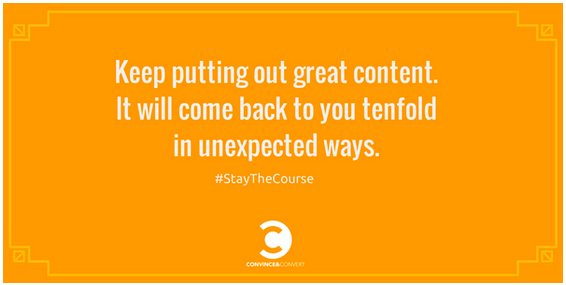Blogging is awesome, it can change your life, it can change the world and I recommend it as a key way to join the global conversation around your area of interest online.
Other people at startups often ask me how I connected with Little Bird lead investor Mark Cuban, among the many other awesome investors we’ve raised money from for our startup. Our technology finds the most influential people in any industry and helps you build relationships with them, it’s used by some of the biggest companies in the world – but our first fundraising relationships were mostly built the old-fashioned way: by blogging a lot. Blog, blog and blog some more.
This morning I started to respond to an email from Portland’s mega-connector Rick Turoczy asking me to offer some advice about connecting with famous investors to a current member of the PIE startup incubator. I thought it would be helpful to answer the email in a blog post.
Dear fellow startup founder,
The primary thing that has made a big difference for me has been to blog. To write about my thoughts on my industry in a publicly visible way so that my personality and perspective were discoverable.

That’s how Mark Cuban found me, from reading my personal blog, before I was blogging on a big site like TechCrunch. No SharkTank in this case.
One day, years ago, before I had written for TechCrunch or ReadWriteWeb, when I was just blogging on my personal site, Marshallk.com, I got an email out of the blue, from Mark Cuban, asking me to take a look at some proposed changes by one of his portfolio company’s website. There was an odd link to a Russian-hosted server and I thought “why would Mark Cuban email me? This has got to be some kind of scam.” But it had his email in the Reply to field, so emailed him. “Mr. Cuban,” I said, “I think someone is impersonating your email address and sending this weird link out to bloggers.” “No!” he wrote me back, “that was me! I read your blog and I like what you write about search and RSS, and I wondered if you’d take a look!”
And so I did, and our relationship was sparked. Seven years later I was raising money for Little Bird and Portland Startup Mentor Carolyn Duncan said “just shut up, sit down and write out the names of all the high net worth people you’ve met in your work that you think might be interested and email them!” My wife and co-founder Mikalina said, “don’t forget Mark Cuban!” Sure enough, I never delete a GMail, so I went back, opened the old thread and hit reply. The rest is history, and is detailed in this awesome Wall St. Journal article.
But it was all about my blog posts. That’s how I built the connections that led to investors like Howard Lindzon, Jay Baer and Matt Haughey too. Smart people who work on the internet read blogs. Admittedly, Mark Cuban especially reads blog posts. He’s an active blogger himself, he funded the first blog network in Weblogs Inc. (where I later went on to work for Jason Calacanis), he’s a blog guy.
But sometimes other people read my blog posts, liked them, liked me, then were interested in my work (including Little Bird) and when they saw it – told their famous investor friends they should check it out. Deb Landa knew my blog, then one day when she was visiting Portland and was in PIE, she knew me, asked to see my work, and thought Howard Lindzon would like it. Howard has now been our most helpful investor source of big intros. Dylan Boyd, one of the most-connected people in Portland, knew me as a blogger and told Jay Baer to check out my company. Jay is one of the smartest investors in the world about our industry. Andy Baio knew me as a blogger and told Matt Haughey about my startup. When old-school social media innovators hear Matt’s an investor, they know we’re the real deal. Not all of our financing has come as a direct result of blogging, our biggest investor is now the awesome Oregon Angel Fund – but even they were no doubt encouraged to invest in my social media startup because of my domain expertise.
So blog, is my suggestion! As our great investor Jay Baer said yesterday on Twitter, “Keep putting out great content. It will come back to you tenfold in unexpected ways.” What should you blog about? That’s one of the questions we can help answer at Little Bird, in fact – by helping find the hottest conversations among the leading thinkers in your industry.
How can you do that while busy doing everything else you need to do to create a startup? I really struggle with that now. But one way that social media pioneer Dave Winer does it is this: he answers interview requests with blog posts. Dave helped invent blogging (as well as podcasting, RSS and more) and goes so far as to say “Blogging is a lifestyle, not something you do inbetween things. For a guy like me, it’s the background, it’s what I do when idle, and when busy, it’s what I think about every waking hour.”
I tried to do that here, because this is a topic people ask me about a lot and I’m really struggling to consistently blog while building a startup now with 17 people in it. But that is a big part of what got me to where I am today and I shouldn’t lose it just because my primary focus is now on company building. The best evolution, says Ken Wilber (whose book I would have been reading over coffee if I hadn’t been writing this email – which is fine), combines transcendence and integration. I’ve moved on from my days as a full-time blogger, but I’ve not integrated the best practices from that experience well enough in my new life. Thanks for inspiring me to do something about that this morning.
Let me know if you’d like to hop on the phone or drop by our office to discuss this further.
best wishes and good luck!
Marshall

